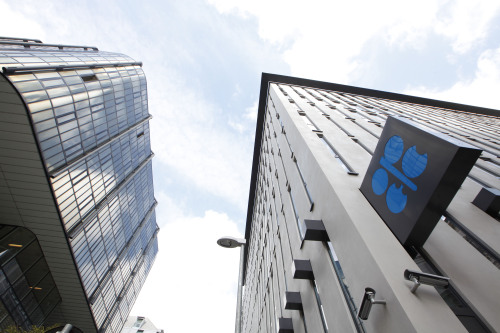Members joining Saudi Arabia in raising production to allay fears of supply crunch in West
Oil’s march towards $120 a barrel sparked a frantic day across financial markets, as OPEC members prepared to increase production and investors seeking a “safe haven” drove the price of gold to a fresh high.
Fears were intensified as Libya witnessed a day of fierce clashes between forces loyal to Colonel Gadhafi and those trying to topple his dictatorship, while in Saudi Arabia, the region’s biggest oil producer, activists renewed calls for a day of protest later this week.
That helped propel Brent crude as high as $118.50 a barrel, though it later retreated to close down 93 cents at $115.04 in volatile trading. U.S. crude prices briefly jumped to an intra-day high of $107 a barrel.
The unexpected political upheaval sweeping North Africa and the Middle East has caught investors unaware since it erupted at the start of the year. Though an improving world economy had sent oil higher in the final three months of last year, experts say a sustained run at around $120 a barrel risks a serious headwind to the recovery.
“Evolving events in the Middle East have to grip the attention of markets until the uncertainty is resolved,” said Steven Weiting, an economist in New York at Citigroup.
Oil’s march towards $120 a barrel sparked a frantic day across financial markets, as OPEC members prepared to increase production and investors seeking a “safe haven” drove the price of gold to a fresh high.
Fears were intensified as Libya witnessed a day of fierce clashes between forces loyal to Colonel Gadhafi and those trying to topple his dictatorship, while in Saudi Arabia, the region’s biggest oil producer, activists renewed calls for a day of protest later this week.
That helped propel Brent crude as high as $118.50 a barrel, though it later retreated to close down 93 cents at $115.04 in volatile trading. U.S. crude prices briefly jumped to an intra-day high of $107 a barrel.
The unexpected political upheaval sweeping North Africa and the Middle East has caught investors unaware since it erupted at the start of the year. Though an improving world economy had sent oil higher in the final three months of last year, experts say a sustained run at around $120 a barrel risks a serious headwind to the recovery.
“Evolving events in the Middle East have to grip the attention of markets until the uncertainty is resolved,” said Steven Weiting, an economist in New York at Citigroup.

Investors weren’t betting on a quick resolution yesterday, as a flight to safer assets pushed the gold price to a new high of $1,444.30.
Stock markets, in turn, retreated, with the FTSE 100 closing down 0.3pc at 5,974. The S&P 500 slipped almost 1pc in New York trading, while prices for government bonds rose.
Crude’s early rise caused a day of headaches and debate for those controlling much of global oil production.
OPEC said members are consulting on whether to hold an emergency meeting. Key members, including Kuwait, the United Arab Emirates and Nigeria, have joined Saudi Arabia in planning to lift production to fill the hole left by Libya.
Saudi Arabia has raised output by 700,000 barrels a day and the others are adding an estimated 300,000 barrels a day. The International Energy Agency estimates the crisis in Libya has cut supply by about 1m barrels a day.
The rise in prices poses the greatest threat to fragile economies, including Britain. “Along with fiscal tightening and food prices, oil prices are a real threat to the U.K.,” said Julian Jessop, an economist at Capital Economics.
The consultancy still expects the country to skirt a double-dip recession, but predicts just 1.5pc growth this year and next.
High oil prices have put the British Government under pressure to scrap the planned rise in fuel duty and the Chancellor dropped his broadest hint yet that there may be help for drivers in the Budget. “I am looking, of course, at fuel duty,” he said yesterday. “I am seeing what I can do to help.”
In the U.S., the White House is considering tapping the country’s strategic oil reserves if prices keep heading north. “We are looking at the options. The issue of the reserves is one we are considering,” said William Daly, President Barack Obama’s chief of staff.
America last tapped its reserves, which hold about 727m barrels a day, in 2005 in the wake of Hurricane Katrina. Analysts at Deutsche Bank argue that should oil reach $125 a barrel, gasoline prices will hit $4 and cause consumer spending in the U.S. to halve. Gasoline prices are close to a two-year high of $3.81 a gallon, according to the “AAA,” a U.S. motoring organization.
(AFP)








![[Graphic News] More Koreans say they plan long-distance trips this year](http://res.heraldm.com/phpwas/restmb_idxmake.php?idx=644&simg=/content/image/2024/04/17/20240417050828_0.gif&u=)
![[KH Explains] Hyundai's full hybrid edge to pay off amid slow transition to pure EVs](http://res.heraldm.com/phpwas/restmb_idxmake.php?idx=644&simg=/content/image/2024/04/18/20240418050645_0.jpg&u=20240419100350)





![[From the Scene] Monks, Buddhists hail return of remains of Buddhas](http://res.heraldm.com/phpwas/restmb_idxmake.php?idx=652&simg=/content/image/2024/04/19/20240419050617_0.jpg&u=20240419175937)

![[KH Explains] Hyundai's full hybrid edge to pay off amid slow transition to pure EVs](http://res.heraldm.com/phpwas/restmb_idxmake.php?idx=652&simg=/content/image/2024/04/18/20240418050645_0.jpg&u=20240419100350)

![[Today’s K-pop] Illit drops debut single remix](http://res.heraldm.com/phpwas/restmb_idxmake.php?idx=642&simg=/content/image/2024/04/19/20240419050612_0.jpg&u=)